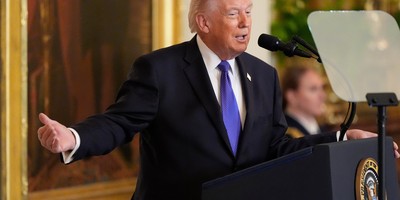If you had bought $1,000 worth of General Motors stock in 2000, your holdings would now be worth less than $40, for a loss of 96 percent. You could have made worse investments in that period -- with Bernard Madoff, for one -- but not many.

So anyone looking to participate in a viable business would look a lot of other places before they would look there. But the United States government thinks GM might just be a really smart place to put its money.
In its final weeks, the Bush administration lent the automaker $13.4 billion, along with $4 billion for Chrysler. On Monday, President Obama gave GM 60 days to come up with a better plan before deciding whether to sink more cash into it. But he placed a large bet on its survival by promising to guarantee all GM and Chrysler vehicle warranties.
He also held out a shimmering vision of the Big Rock Candy Mountain, expressing faith that his policies can lead to "a 21st-century auto industry that is creating new jobs, unleashing new prosperity, and manufacturing the fuel-efficient cars and trucks that will carry us towards an energy-independent future."
Truth is, that industry already exists. The Big Three just don't happen to be a part of it. The United States has robust, job-creating, fuel-efficient automakers, in the form of companies like Toyota, Honda and Subaru.
But they don't count in the eyes of this president, presumably because their employees don't belong to the United Auto Workers union. So he apparently couldn't care less how much they resemble what he fantasizes GM and Chrysler will soon become.
And a fantasy it is. On what basis could anyone expect GM or Chrysler to achieve greatness? It's like expecting a glacier to appear in Phoenix. Just because it happened a long time ago doesn't mean it's going to happen again anytime soon, if ever.
Recommended
At one time, GM accounted for 60 percent of the cars sold in America, but its market share has fallen to 22 percent. It has lost money for four straight years, including a staggering $31 billion in 2008, and things are only getting worse. Sales in February 2009 were less than half what they were in February 2008.
Chrysler has not exactly set the world on fire either. It torched $8 billion last year. Some of its investors now value their stakes at pennies on the dollar -- or nothing. Its U.S. sales have plunged by nearly half over the last decade. In this year's Consumer Reports rankings of the 10 worst cars, seven are GM or Chrysler products.
The administration's own industry task force doesn't share Obama's unbounded optimism. In a report released this week, it noted that GM's supposed salvation, the plug-in hybrid Chevrolet Volt, "will likely be too expensive to be commercially successful in the short term."
It ridiculed GM's own cheery forecast, which assumes rising profits "despite a severely distressed market, lingering consumer quality perceptions and an increase in smaller vehicles (where the company has previously struggled to maintain pricing power)." Even under generous assumptions, it said, GM would keep losing money.
Given all these sad tidings, it's hard to avoid the conclusion that the only hope is bankruptcy court -- where it could shed some of its obligations by stiffing creditors and rewriting union contracts. Obama seems to think the auto industry is too important to be subjected to such an indignity, though he has not ruled it out.
But to survive in the long run, a company has to provide consumers with products they want at a price that yields healthy profits. That is exactly what GM, like Chrysler, has consistently been unable to do.
In those circumstances, neither bankruptcy nor any other course offers a plausible route to prosperity. Plausibility, however, is not a consideration among politicians determined to keep the Big Three in business no matter what.
In recent months, we've been told that ambitious federal action is needed in the financial sector because unregulated commerce produced disastrously perverse results. But in the auto industry, competition has functioned reliably to reward sound companies and penalize bad ones. So clearly, there are only two occasions for massive government intervention: when the market fails, and when it works.

























Join the conversation as a VIP Member